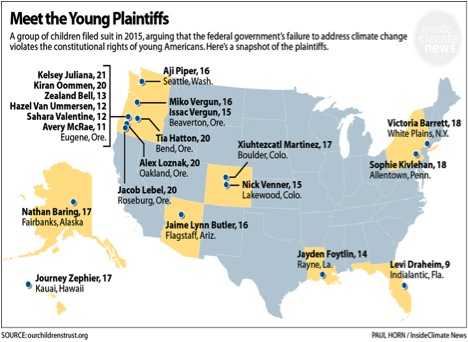REPRINT FROM INSIDE CLIMATE NEWS
A federal court will hear arguments on whether a novel global warming lawsuit that would pit the U.S. government against children can move to trial.
Nov 17, 2017

Jayden Foytlin is one of 21 children and young adults who are suing the government over climate change. Credit: Neela Banerjee/InsideClimate News
A federal appeals court announced that it will hear oral arguments on December 11 on whether a groundbreaking climate change lawsuit brought by 21 children and young adults against the Trump administration can proceed to trial.
A trial date of Feb. 5, 2018, in Eugene, Oregon had been set by a lower federal court in the lawsuit, Juliana et al v. United States.
But in July, the Ninth Circuit Court of Appeals in San Francisco paused the lawsuit after the Trump administration filed a petition asking it to review the lower court’s decision to allow the case to go to trial. The Department of Justice contended in its petition that proceeding with the case would launch a discovery process that would be onerous to the federal government.
Filed in 2015, Juliana et al v. United States seeks sweeping changes in federal climate efforts and in government programs that subsidize or foster the development of fossil fuels. A trial would mean that decades of federal policy on fossil fuels and climate change—including information that had previously been unknown or hidden—could come to light through discovery and be subject to public scrutiny even before the court renders a decision. The suit was brought by Our Children’s Trust, an environmental advocacy group.
The country’s most powerful fossil fuel lobbies, which had voluntarily intervened in the case and fought to have it dismissed, took the unusual step earlier this year of asking a federal judge for permission to withdraw from the lawsuit. A judge granted their request.
The Justice Department declined to comment on the latest development.
Julia Olson, co-counsel for plaintiffs and executive director of Our Children’s Trust, said she welcomed the decision to argue the case before the appeals court.

The lawsuit is based on a legal concept called the public trust doctrine, which argues that the government holds resources such as land, water or fisheries in trust for its citizens. Climate litigators contend that the government is a trustee of the atmosphere, too. The doctrine’s power flows from the Fifth, Ninth and Tenth Amendments, and the Vesting, Posterity and Nobility Clauses of the Constitution, according to the plaintiffs.
In 2015, plaintiffs in the Netherlands, South Africa and Pakistan, as well as Massachusetts and Washington state, won similar human rights or constitutional cases that force authorities to more aggressively cut carbon emissions.
The plaintiffs in Juliana argue that the federal government has known for at least 50 years that combustion of fossil fuels adds carbon dioxide to the atmosphere and changes the climate. Because it chose not to limit fossil fuel use and cut greenhouse gases, the government violated the plaintiffs’ right to protection from environmental degradation under the trust doctrine, the suit alleges.
Federal Judge Ann Aiken of the Oregon District will hear the case if the appeals court allows it to go to trial. Aiken and a colleague filed a letter with the appeals court that said they do not believe the federal government would be “irreversibly damaged” by the discovery process, and that the lawsuit is “a complex case involving vital interests on both sides.”
About the Author

Neela Banerjee
Neela Banerjee is a Washington-based reporter for Inside Climate News. She led the investigation into Exxon’s early climate research, which was a finalist for the 2016 Pulitzer Prize for Public Service reporting and the recipient of nearly a dozen other journalism awards. Before joining ICN, she spent four years as the energy and environmental reporter for the Los Angeles Times’ Washington bureau. Banerjee covered global energy, the Iraq War and other issues with The New York Times. She also served as a Moscow correspondent with The Wall Street Journal. Banerjee grew up in southeast Louisiana and graduated from Yale University.

Follow our social channels